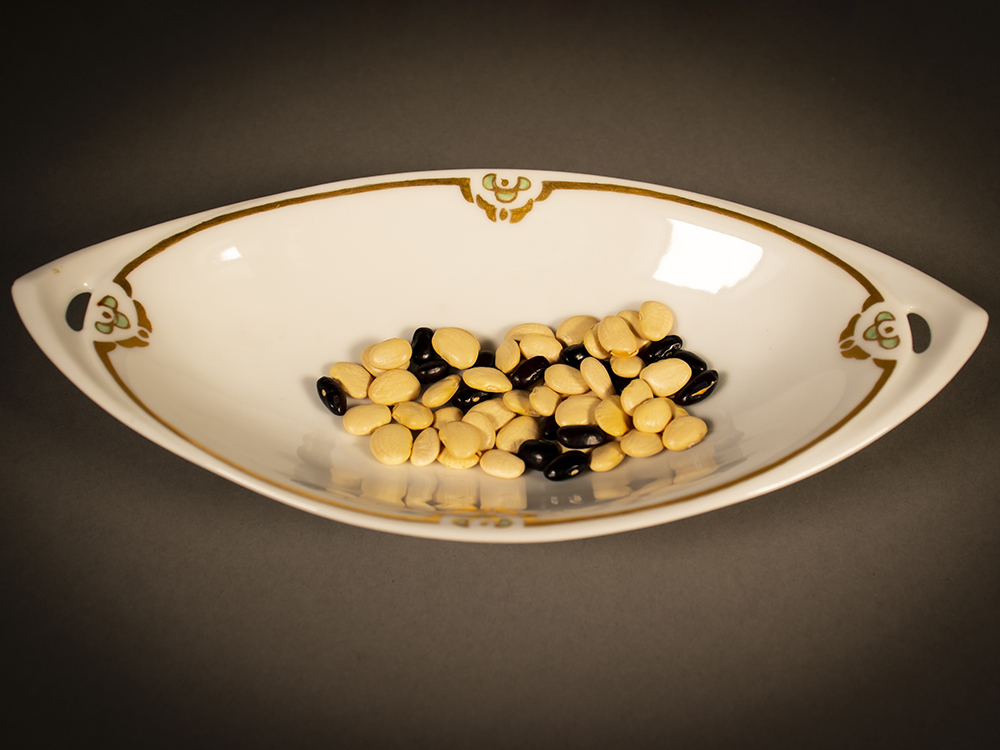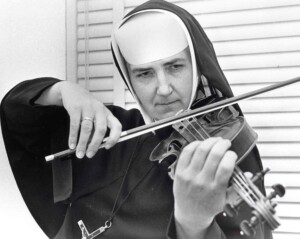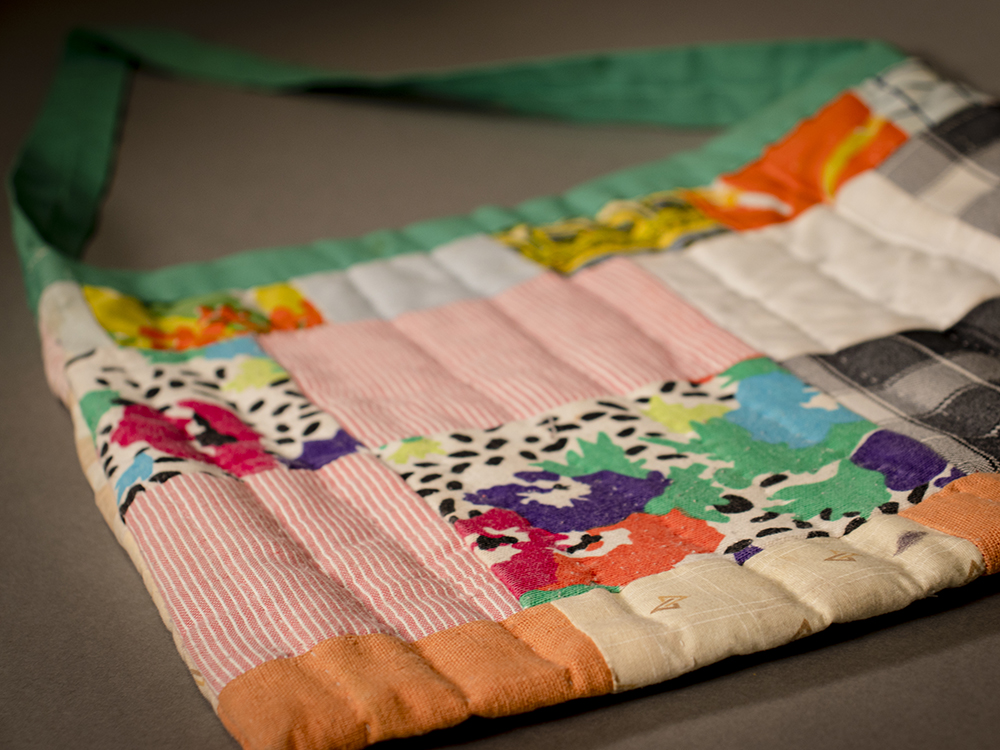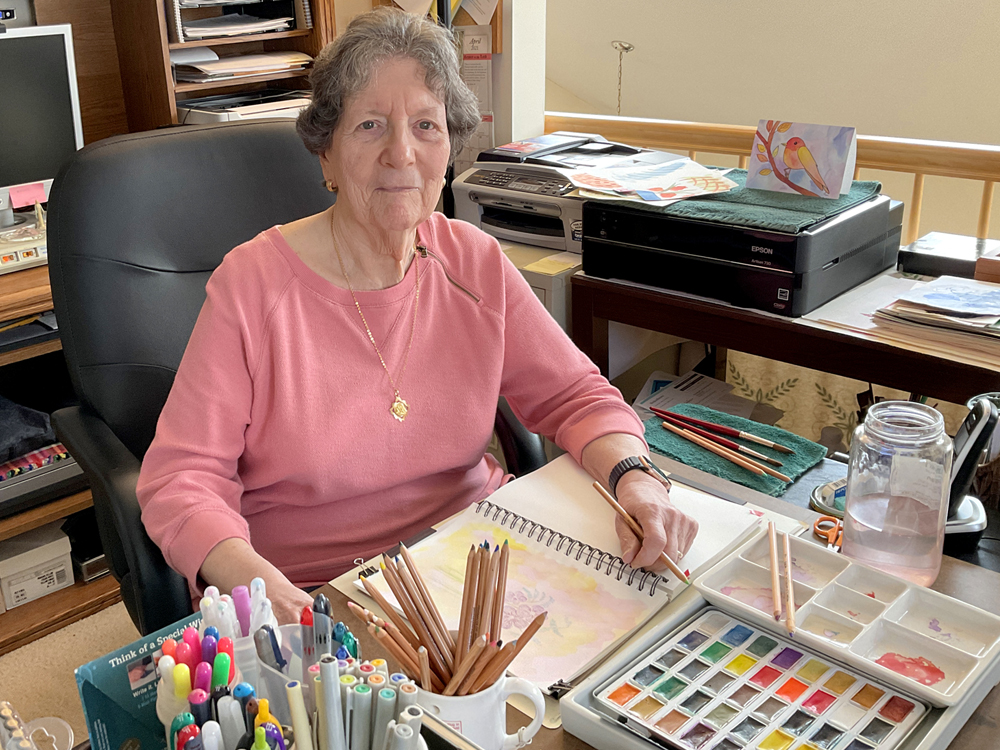spacer
spacer
News
Holy Names History – Voting Beans

These black and white beans were used as voting markers by Sisters in California after Vatican II, when the hierarchical structure of religious life began to change in favor of a more democratic system.
Photo courtesy of SNJM U.S.-Ontario Archives.
We’re sharing objects from the Archives of the Sisters of the Holy Names of Jesus and Mary. The Archives catalogues historical records, objects and publications in order to preserve the history of our institution, schools and ministries.
Holy Names History – Quick Elastic Starch


Sisters in Washington and Oregon used Quick Elastic starch to prepare the coif and bandeau that surrounded their faces when they wore the traditional SNJM habit.
Here’s Sister Xavier Mary Courvoisier playing her violin, circa 1962 – Quick Elastic is certainly to thank for keeping her habit clean and crisp!
Sister Xavier Mary, a graduate of Julliard with a master’s degree in violin, taught music at Fort Wright College and Gonzaga University in Spokane and Holy Names University in Oakland.
Photo courtesy of SNJM U.S.-Ontario Archives.
We’re sharing objects from the Archives of the Sisters of the Holy Names of Jesus and Mary. The Archives catalogues historical records, objects and publications in order to preserve the history of our institution, schools and ministries.
Holy Names History – Tutwiler Tote

This purse is an early creation from the Tutwiler, Mississippi quilters. This group was encouraged by encouraged by Holy Names Sister Maureen Delaney and Dominican Sister JoAnn Blomme, who saw an opportunity for the women in the area to earn income from their traditional quilt making back in the 1980s.
Photo courtesy of SNJM U.S.-Ontario Archives.
We’re sharing objects from the Archives of the Sisters of the Holy Names of Jesus and Mary. The Archives catalogues historical records, objects and publications in order to preserve the history of our institution, schools and ministries.
Holy Names History – Go Cardinals!

A toy megaphone from Sacred Heart Academy in Salem, Oregon. Circa 1980. Go Cardinals!
Photo courtesy of SNJM U.S.-Ontario Archives.
We’re sharing objects from the Archives of the Sisters of the Holy Names of Jesus and Mary. The Archives catalogues historical records, objects and publications in order to preserve the history of our institution, schools and ministries.
Beauty in Our World: Sister Maria Faina

Sister Maria Faina
When Sister Maria reflects on her penchant for “doing art,” as she likes to call it, she credits her parents for nurturing her creativity. She inherited their yearning to bring beauty into their surroundings. She recalls her mother’s ingenuity with flowers and handiwork like crocheting and embroidery, and her father’s love of opera and how it filled their home with soaring sounds.
Over the years, Sister Maria has experimented with all sorts of artistic media. Whether it be collage, decoupage, watercolor or drawing, she just goes where the brush, pencil or pen lead her. Some of her creations, like her fanciful doodling, explore the space in between traditional artwork and personal expression. To her, anything that gives visible form to what one sees or feels becomes an art form.
Photography provides her with an important way to capture sources of inspiration, both in her travels and on walks around gardens and parks near her home in Silver Spring, MD. Through photos notecards, these images have become part of her body of work.
Sister Maria’s fascination with “doing art” is sustained by the knowledge that there are endless possibilities yet to be discovered. She finds that “when I DO ART, I am nourished and free.”

Beauty in Our World: Sister Jean Morningstar

Sister Jean Morningstar
During her college years, Sister Jean enrolled in an art class taught by Sister Maria Luisa Wolfskill (Sr. Mary Luke). With her teacher’s encouragement to develop her talent and to major in art, Sister Jean became an art teacher herself, and in turn became an advocate for her own high school art students. She gave them lifelong skills to share their creativity and appreciation for art. One of the students who took her class in stained glass at St. Monica High School in California is now a professional artist who produces stained glass windows for churches and other structures. Many of her students stay in touch with Sister Jean, expressing gratitude for the way she showed belief in them and helped them develop their own talents and confidence.
After teaching art for 32 years, Sister Jean expanded her ministry of education by founding Holy Names Graphics in 1984. It continues to provide resources, including clip art, for schools, parishes, retreat centers, hospitals and religious orders nationally and internationally. Sister Jean also shares her abilities with those who lack financial resources for graphic design services.
Sister Jean continues to develop new skills in graphic design, using multiple computer programs as she creates new images. She never knows what the day will bring in terms of requests for her artwork.
When asked what gives her life in her current ministry, she says, “Listening to and understanding the idea that an individual wants to express and creating a design that conveys that message.”

Mother Marie Rose by Jean Morningstar, SNJM
Sisters Pray for Healing After Mass Shooting in Buffalo

As Sisters of the Holy Names of Jesus and Mary, we pray for healing in the wake of lives lost or shattered by the ghastly mass shooting in Buffalo, NY on May 14. We grieve for each victim, and for the United States, a nation torn by racial fears and divisions that have, again and again, resulted in the nightmare of deadly gun violence.
We call on people everywhere, especially those in positions of political leadership, to turn away from the sins of racism and violence. It is abhorrent that another Black community has been subjected to trauma and loss by a person proclaiming white supremacist views. We must completely reject baseless claims about “replacement theory” and fear-based conspiracies. As a society, we must learn to live in peace with one another, with respect for our common humanity and reverence for the gift of life.
Beauty in Our World: Sister Patricia Basel

Sister Pat Basel at work.
Art has always been a part of Sister Pat’s life. Her beloved elementary school art teacher inspired Sister Pat to enroll in painting classes for three years at Holy Names Academy in Seattle. In college, she continued her education in a variety of art classes at Marylhurst College, including calligraphy taught by Sister Loyola Mary.
As an elementary and middle school teacher, Sister Pat loved teaching art to her students. They looked forward to Fridays, which she designated as a special day to foster their creative spirits.
After serving in leadership of the Holy Names community for 10 years, Sister Pat took a one-year sabbatical, during which she explored oil painting at Wenatchee Community College. In 2005, at the age of 81, she retired and started devoting more time to watercolor painting. Her works made a welcome addition to the annual Fall Bazaar and fundraising events.
Today, at 98, Sister Pat appreciates beauty in the world around her retirement community in Spokane, WA.

Sister Pat’s paintings.

Community Gives Thanks for the Life of Sister Kay Burton

Sister Kay Burton, SNJM
There is much to be grateful for because of the life of Sister Kay Burton. Sister Kay died on March 18, surrounded by the prayers of her Holy Names Sisters and the countless friends she made during more than three decades of ministry in the Mississippi Delta.
Near the end of her life, Sister Kay realized she’d have to leave Jonestown, Mississippi to return to Washington state, where she was lovingly cared for by family members and the Sisters in her last days. But Jonestown never stopped being home to her. It’s the place where she lived, loved, taught and built beginning in the late 1970s. Before her departure, Sister Kay visited with residents of Jonestown so they could say goodbye and thank her for her transformative work with children, teens, families and the town itself.
“Sister Kay loved being in Jonestown with the local people,” said Sister Maureen Delaney, leader of the Sisters of the Holy Names of Jesus and Mary U.S.-Ontario Province. “She loved developing enriching programs with and for the children, teens and families, and they in turn enriched her life with their love and friendship.”
Sister Kay first came to the Delta in 1979 to teach summer school at Immaculate Conception in Clarksdale. She, along with several other Sisters of the Holy Names from the West Coast, came to love the warmth and dedication to community among the people they met. During the couple of years that Sister Kay stayed in Clarksdale, she got to know the family of a student from Jonestown. The child’s family urged her to come to Jonestown to help students there who were struggling with their lessons.
It was a perfect match for Sister Kay’s energetic and visionary talents. She had already spent years developing peace education and anti-racism programs as an inner-city teacher and administrator in Seattle, Washington. However, her Holy Names community called her to a leadership role in 1983, and that five-year commitment had to come first. But she purchased a house in Jonestown and continued to support the ministries of the other Sisters who went to Mississippi to teach — including Sisters Rose Monica Rabdau, Mildred Hein, Anne Skok and Teresa Shields.
“I will be forever grateful that Sister Kay chose me to live and minister in Jonestown for 32 years,” said Sister Teresa. “My life has been changed for the better.”

This group of girls from the Academy of the Holy Names in Tampa, FL participated in a 2012 mission trip to Jonestown. For years, students recruited by Sister Kay came to experience the town’s rich community life and to serve in various ways.
As soon as her term in leadership ended, Sister Kay drove to Mississippi in a van named “Old Yeller,” bought a second house and immediately started remodeling it to make appropriate space for tutoring. She reached out to the community to find out what people wanted, which led her to organize garden projects, softball teams, life skills classes and GED programs. A major emphasis for her was music — despite not being a musician herself, she recruited others to come to Jonestown to teach music, including Dolores Fields Mason, who passed away earlier this month. The result was joyful singing at annual Christmas celebrations and Black history presentations, as well as piano recitals and other wonderful gatherings.
Her successful volunteer recruitment campaigns led to innumerable home repair and Habitat for Humanity projects to benefit Jonestown residents. Volunteers also helped upgrade facilities for basketball, baseball and track, as well as creating a playground for younger children. Sister Kay also took young people from Jonestown on trips to meet Sisters and other people involved in service work in places ranging from the Native American community in Wapato, Washington to the Holy Names convents in Lesotho, Africa.
As difficult as it was for Sister Kay to say goodbye to a place she loved so dearly, she knew that God’s faithful presence in the Mississippi Delta would continue through the many ministries she and the other Sisters brought to reality.
Memorial gifts may be made to Sisters of the Holy Names Ministry Fund, PO Box 398, Marylhurst, OR, 97036 or online here.
Beauty in Our World: Sister Marilyn Nunemaker

Sister Marilyn continues to find inspiration for her works in nature.
For Sister Marilyn Nunemaker of Portland, OR, art is a spiritual path, a creative engagement with God, particularly through the splendor of nature. “With my art,” she says, “I want to give God glory with nature.”
Her primary subject is landscape, ranging from her own backyard awash in color to broad forest and mountain vistas and beachscapes drawn from her extensive hiking trips.
Wherever she goes, Sister Marilyn brings a camera so she can record images she might later use as inspiration for a painting. Her primary medium is pastels, which have the intensity of color that she feels captures the vibrancy of what she is painting. They are messy but forgiving, she says, and you can make a mistake or change your mind and adjust it. Essential to art for her is intention, of looking deeply into the subject, noticing change and nuance.
In her ministry as an educator, art has always been an important component. She worked with middle schoolers for 23 years and with adult learners for an additional 23 years as a GED instructor at Portland Community College, and art always infused her teaching strategies. Across all disciplines, she relied on art to enliven and vitalize learning.
Through the making of art, Sister Marilyn has a ready avenue to God, and it gives her a sense of joy to freely share it with others.

Sister Marilyn’s pastels.

Sister Marilyn’s work on display in her Portland studio.
